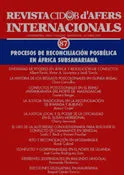Procesos de reconciliación posbélica en África Subsahariana

Revista CIDOB d'afers internacionals, núm. 87
This volume deals with the role of what are called "traditional" authorities in the resolution of conflicts in various countries in sub-Saharan Africa. After gaining their independence, the governments of the new post-colonial states tended to ignore the mediating role of many traditional leaders. In spite of this, the activities to promote peace carried out by said authorities (which include religious chiefs, sacred kings, traditional courts, etc.) continued, and furthermore they often did so in the shadow of specialist studies and international institutions. In the last few years, there has been a renewed interest in these leaders, as they have demonstrated both the legitimacy they can possess for the local population and their ability to operate in the face of crisis situations. Furthermore, these actors have to do battle not only with state governments but also with other autochthonous powers, as well as with the increasing presence of numerous international cooperation agents. Specifically to analyse the diversity of strategies and difficulties experienced by these authorities, in November 2008, CIDOB, together with the Centro de Estudos Africanos of ISCTE (Lisbon) and the network ARDA/ARDA/RIDA (Network for Research and Teaching on Africa), held the 2nd Conference on Traditional Authorities in Africa (which was a continuation of the first conference, held in Lisbon in 2007), under the title “Peace and the word: processes of post-war reconciliation in sub-Saharan Africa", and which examined the cases of Casamance (Senegal), Guinea-Bissau, Sudan, Uganda, Rwanda, Burundi, Angola, Mozambique and Madagascar. This volume represents the results of that experience. II Jornadas de autoridades tradicionales en África
ISSN: 1133-6595 (print edition) / ISSN: 2013-035X (online edition)
>> Complete texts of the articles in Spanish version